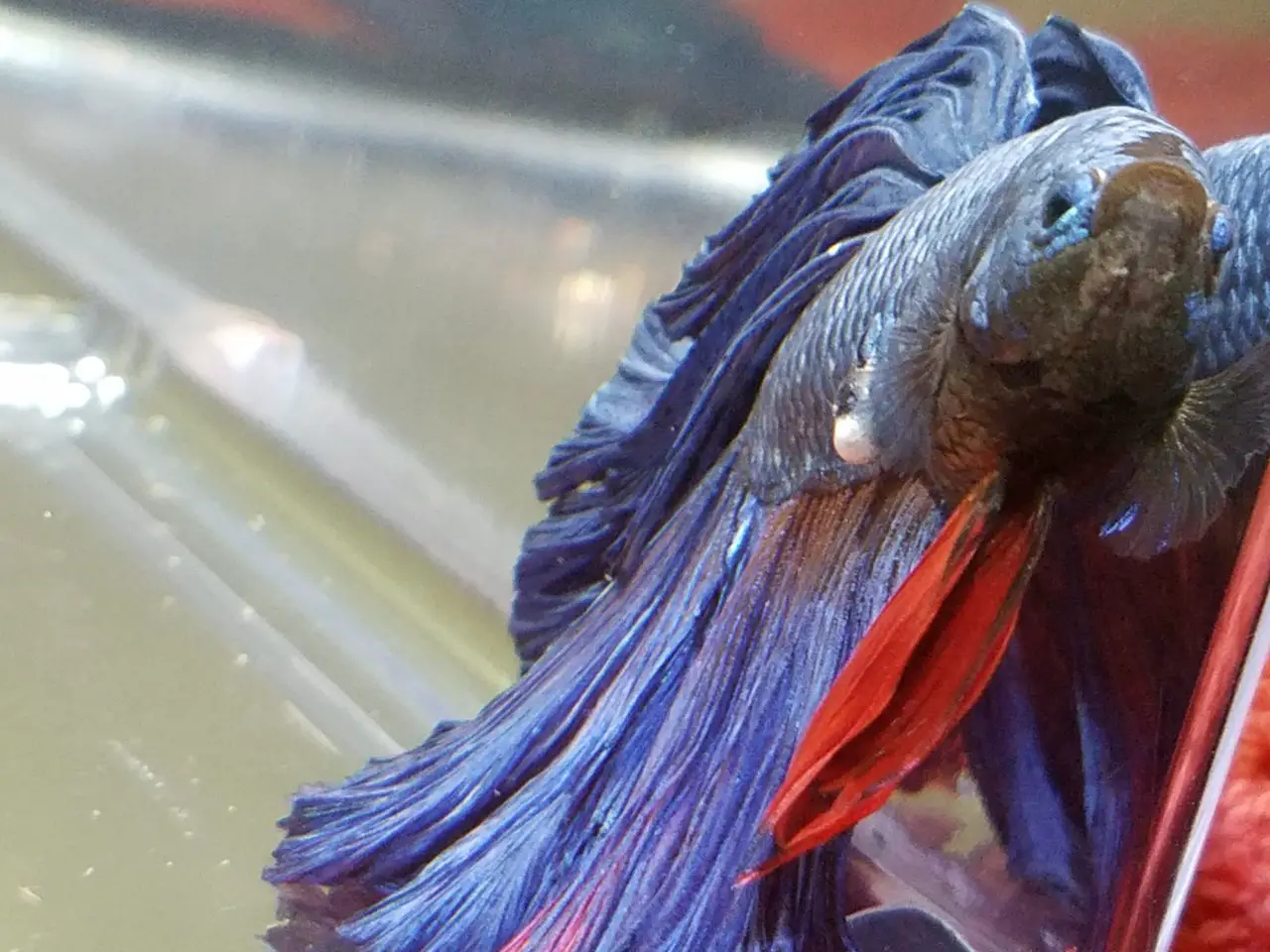Betta fish are beautiful and colorful creatures that can brighten up any aquarium. However, even with the best care, accidents can happen, and your betta fish can get injured. It is essential to know how to administer first aid to your betta fish in such situations to prevent further harm.
In this article, we will discuss the common injuries that betta fish may encounter and the steps you can take to provide first aid to your fish. We will cover everything from cuts and bruises to fin rot and swim bladder disease, so you can be prepared for any situation that may arise with your beloved betta fish.

First Aid for Injured Betta Fish
Betta fish, also known as Siamese fighting fish, are popular pets known for their stunning colors and beautiful fins. Unfortunately, like any living creature, betta fish can get injured. Injuries can range from minor scrapes to more serious wounds that can even be life-threatening. As a responsible betta fish owner, it’s important to know how to administer first aid for injured betta fish. Here’s what you need to know:
Recognizing Injuries in Betta Fish
The first step in administering first aid to your betta fish is to recognize the signs of an injury. Some of the most common injuries in betta fish include torn fins, open wounds, and swim bladder issues. Torn fins can be caused by sharp objects in the tank or aggression from other fish. Open wounds can be caused by rough handling or attacks from other fish. Swim bladder issues can be caused by overfeeding or poor water quality.
If you notice any of these signs in your betta fish, it’s important to take action immediately to prevent the injury from getting worse. Here’s how to administer first aid for each type of injury:
Treating Torn Fins
Torn fins are a common injury in betta fish. If you notice that your betta’s fins are torn, the first step is to remove any sharp objects from the tank that may have caused the injury. You can also add a betta-specific water conditioner to the tank to help promote fin regrowth.
In addition, you can use aquarium salt to help prevent infection and promote healing. Dissolve one tablespoon of aquarium salt per gallon of water and add it to the tank. Make sure to monitor your betta’s behavior and remove any excess salt after a few days.
Treating Open Wounds
Open wounds can be more serious than torn fins and may require more intensive first aid. If you notice an open wound on your betta fish, the first step is to isolate them in a separate tank to prevent further injury.
Next, you can gently clean the wound with a betta-specific antibacterial solution. Apply the solution to the wound using a cotton swab or dropper and monitor your betta’s behavior closely. If the wound does not heal within a few days, you may need to consult a veterinarian for further treatment.
Treating Swim Bladder Issues
Swim bladder issues can cause your betta fish to float or sink in the tank and can be a sign of a more serious underlying issue. If you notice that your betta fish is having trouble swimming, the first step is to check the water quality in the tank.
Make sure that the water temperature is between 76-82 degrees Fahrenheit and that the water is clean and free of debris. You can also try fasting your betta fish for a few days to help reset their digestive system. If the swim bladder issue persists, you may need to consult a veterinarian for further treatment.
Betta Fish First Aid Kit
As a responsible betta fish owner, it’s important to have a first aid kit on hand in case of emergencies. Here are a few items that should be included in your betta fish first aid kit:
– Betta-specific water conditioner
– Aquarium salt
– Betta-specific antibacterial solution
– Cotton swabs or droppers
– A separate tank or container for isolating your betta fish
Preventing Injuries in Betta Fish
While injuries can happen to any pet, there are steps you can take to prevent injuries from occurring in your betta fish. Here are a few tips:
– Keep sharp objects out of the tank
– Choose tank mates carefully to prevent aggression
– Handle your betta fish gently and carefully
– Maintain good water quality in the tank
By following these tips, you can help keep your betta fish healthy and happy for years to come.
The Benefits of First Aid for Betta Fish
Administering first aid to your betta fish can help prevent minor injuries from becoming more serious and potentially life-threatening issues. By taking action quickly and providing the necessary care, you can help your betta fish recover from injuries more quickly and prevent further complications.
Betta Fish First Aid vs. Veterinary Treatment
While many minor injuries can be treated at home with first aid, more serious injuries or underlying health issues may require veterinary treatment. It’s important to monitor your betta fish closely and consult a veterinarian if you notice any signs of illness or injury that do not improve with first aid.
In conclusion, administering first aid for injured betta fish is an important skill for any responsible betta fish owner. By recognizing the signs of injury, administering first aid when necessary, and taking steps to prevent injuries from occurring in the first place, you can help keep your betta fish healthy and happy for years to come.
Frequently Asked Questions
Here are some common questions about providing first aid for injured Betta fish.
What are the signs that my Betta fish is injured?
Betta fish can sustain injuries in a number of ways, such as fighting with other fish, getting caught in filters or decorations in the tank, or even just being clumsy. Signs that your Betta fish is injured include torn fins, scales missing from their body, or redness and swelling in certain areas. You may also notice that they are swimming oddly or hiding more than usual.
If you suspect that your Betta fish is injured, it’s important to act quickly to prevent further damage or infection. Isolate the fish in a separate tank or bowl, and observe them closely to determine the extent of the injury.
How do I treat torn fins on my Betta fish?
Torn fins are a common injury for Betta fish, and can be caused by fighting with other fish or getting caught on decorations in the tank. To treat torn fins, first remove any sharp objects from the tank that could have caused the injury. Then, add aquarium salt to the water to prevent infection and promote healing. You can also add Betta-specific medicine to the water to help heal the fins more quickly.
If the fins are severely torn or if the fish is showing signs of distress, you may need to remove them from the tank and provide additional care such as antibiotic treatments or wound care. Consult with a veterinarian with experience in treating fish for the best course of action.
What should I do if my Betta fish has an open wound?
If your Betta fish has an open wound, it’s important to act quickly to prevent infection. Isolate the fish in a separate tank or bowl, and clean the wound gently with a sterile cotton swab or soft cloth. Then, apply an antiseptic solution such as iodine or hydrogen peroxide to the wound to help prevent infection.
Keep the fish in a clean, warm environment and monitor them closely for signs of infection, such as redness or swelling around the wound. If the wound does not heal or if the fish shows signs of distress, seek advice from a veterinarian with experience in treating fish.
How can I prevent injuries to my Betta fish?
The best way to prevent injuries to your Betta fish is to provide a safe and stress-free environment. Avoid over-crowding the tank, and make sure that any decorations or plants are soft and free of sharp edges. Keep the water clean and well-filtered, and maintain a consistent temperature and pH level.
In addition, avoid keeping aggressive fish with your Betta, as fighting is a common cause of injuries. And always handle your Betta fish gently and with care to avoid accidental injuries.
When should I seek professional help for my injured Betta fish?
If your Betta fish is showing signs of distress, such as difficulty swimming or breathing, or if they have a severe injury such as a deep wound or missing scales, it’s important to seek professional help. Consult with a veterinarian with experience in treating fish to determine the best course of action.
Additionally, if you have tried treating the injury at home and it does not seem to be healing or is getting worse, it’s important to seek professional help. Fish can be delicate creatures, and injuries can quickly become serious if left untreated.

How To Save A Dying Betta | #Inactive #Betta
In conclusion, knowing how to provide first aid for your injured betta fish is crucial for their survival. By understanding the signs of injury and the appropriate steps to take, you can help your betta fish recover from injuries and live a healthier life.
Remember to assess the severity of the injury and act quickly to prevent further harm. Use clean water and proper medication to treat the wound, and monitor your fish closely for any signs of improvement or worsening.
With the right care and attention, your betta fish can make a full recovery and continue to thrive in their environment. Don’t hesitate to seek professional help if needed, and always prioritize the well-being of your aquatic pets.
